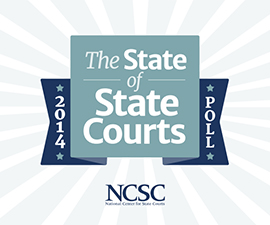Recent Public Opinion Survey Provides Insights into "The State of State Courts"
 A recent survey commissioned by the National Center for State Courts explored public opinions of the court system. Compared to a similar survey conducted in April 2012, assessments of state court systems on such measures as integrity, customer service, and stewardship of taxpayer dollars have improved. However, the public still has concerns about the influence of partisanship and political dealmaking, as well as the potential for waste and inefficiency, in the justice system.
A recent survey commissioned by the National Center for State Courts explored public opinions of the court system. Compared to a similar survey conducted in April 2012, assessments of state court systems on such measures as integrity, customer service, and stewardship of taxpayer dollars have improved. However, the public still has concerns about the influence of partisanship and political dealmaking, as well as the potential for waste and inefficiency, in the justice system.
Here are some highlights among the survey's findings:
- At least 60 percent of respondents described state courts as fair and impartial, providing equal justice to all, and hard working.
- Nearly three-fourths of respondents (72 percent) with direct interaction with the state court system were satisfied with those dealings, regardless of the outcome. However, they rated the courts lower on job performance and customer service than those with no direct contact.
- A narrow majority of respondents (51 percent) believed state judges attain their seats through personal connections or political influence, rather than being selected based on qualifications and experience.
- A roughly equal percentage of respondents described judges as making decisions based on an objective review of facts and the law (48 percent) and as deciding based more on their own beliefs and political pressure (46 percent). A higher percentage of respondents in states that use contested partisan elections to choose judges believed judges rule based on their own beliefs and political pressure (51 percent).
- The strongest deterrent to taking a case to court is the cost of hiring an attorney, and sixty percent of respondents believe court systems are not doing enough for self-represented litigants.
According to the National Center, "State courts are on firmer ground today with the public they serve, and this survey highlights further steps that can be taken to reinforce the faith and trust voters put in them."
The survey is subject to a margin of error of +/- 3.1 percentage points at the 95 percent confidence level.


